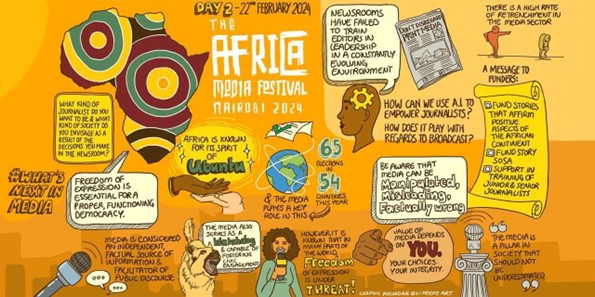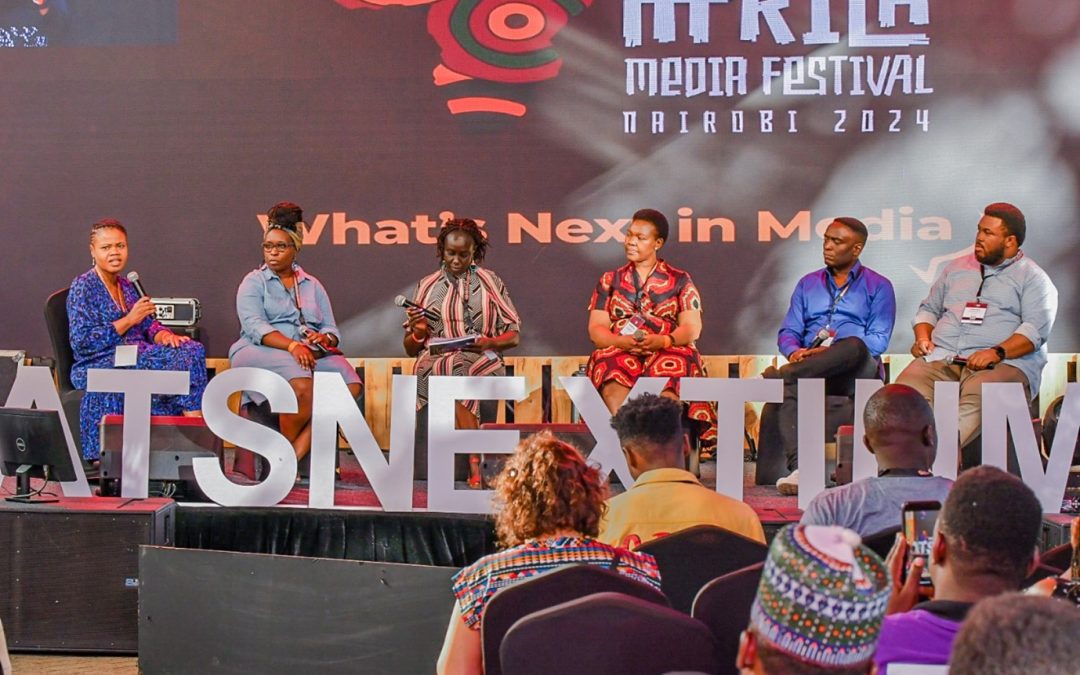The Africa Media Festival 2024, organized by Baraza Media Lab at the National Museums of Kenya, brought together media professionals between February 21 and 22 from across the continent. The festival aimed to celebrate the convergence of media and journalism with art and culture.
The festival featured two keynote speakers: Onica Makwakwa, Executive Director of the Global Digital Inclusion Partnership, who addressed the current state of African media. She highlighted the need for better connections with young audiences, a critical demographic facing a significant burden despite promises of digital connectivity. Makwakwa emphasized the importance of affordable, unlimited internet access and the creation of local and relevant content for Africa.
H.E. Maarten Brouwer, Ambassador of the Kingdom of the Netherlands, delivered the second keynote address. He called for ongoing collaboration among journalists and media organizations to foster civic engagement and social cohesion. Here are a few key takeaways from our time at the festival.
Exploring Innovation and Trends
The festival provided a platform for knowledge sharing and exploration of trends in African media. Informative ignite talks offered insights into evolving roles, challenges, and opportunities for media practitioners. Mamaponya Motsai, CEO of fraycollege (South Africa), discussed “A Bird’s Eye View of Africa’s Media Landscape,” while Francis Sowa, National Coordinator of the Media Reform Coordinating Group (MRCG) in Sierra Leone, addressed “Protecting Public Interest Media: What Next Beyond the Grants?” These talks explored the constructive use of AI and social media platforms in tackling misinformation and the role of mainstream media.
Showcasing Cutting-Edge Media
Seven-minute demos showcased the latest advancements in media technology, products, and creative innovation. Joshua, – CEO of Dataphyte presented Goloka.io, a platform that uses localized data for journalism. Goloka leverages real-time data collection, AI, and geospatial intelligence to empower newsrooms with a deeper understanding of local stories. Wale Lawal, Editor-in-Chief of The Republic, discussed his innovative publication. The Republic offers a high-quality, digitally enabled print magazine, leveraging technology to reintroduce print media to audiences in Nigeria and beyond.
The looming future of AI in media was also on display. The Centre for Innovation and Technology (CITE) from Bulawayo, Zimbabwe, presented ALICE, an AI newsreader offering a novel approach to news presentation.

Baraza Media Lab with a summary of Insight
Fostering Cross-Disciplinary Dialogue
The event offered even more variety of sessions including fast-paced ignite talks aimed to inspire attendees. Rishad Patel, co-founder of Splice Media, led a session on “Finding and Serving Your Audience,” while Maya Misikir, founder of Sifter, discussed “How Running a Newsletter Taught Me the Power of Community.” Mungo Soggot, CEO of Scrolla.Africa, provided insights into engaging African audiences in his talk “Three Critical Lessons in Meeting Underserved Readers Where They Are.”
Workshops and unconference conversations focused on practical skills and knowledge. The MDIF team led a workshop on “Back to Basics: Building a Media Business That Lasts,” covering the fundamentals of media entrepreneurship and fundraising. Other topics explored in workshops included utilizing AI in the newsroom, the impact of storytelling in journalism, podcast curation techniques, and gender reporting.
Unconference sessions allowed attendees to discuss a wide range of issues, including using community media for impact, empowering young storytellers, demystifying crowd-sourced data, and addressing mental health concerns in the media landscape. Mustapha, Head of Production at Lavun Community Radio, and Ikechukwu Onyewuchi, CEO of Ikeja Record, facilitated one such session, sharing insights on audience engagement by community-based media organizations.
Overall, the Africa Media Festival 2024 served as a valuable platform for African media professionals to connect, share knowledge, and explore innovative approaches to media development in the continent.

